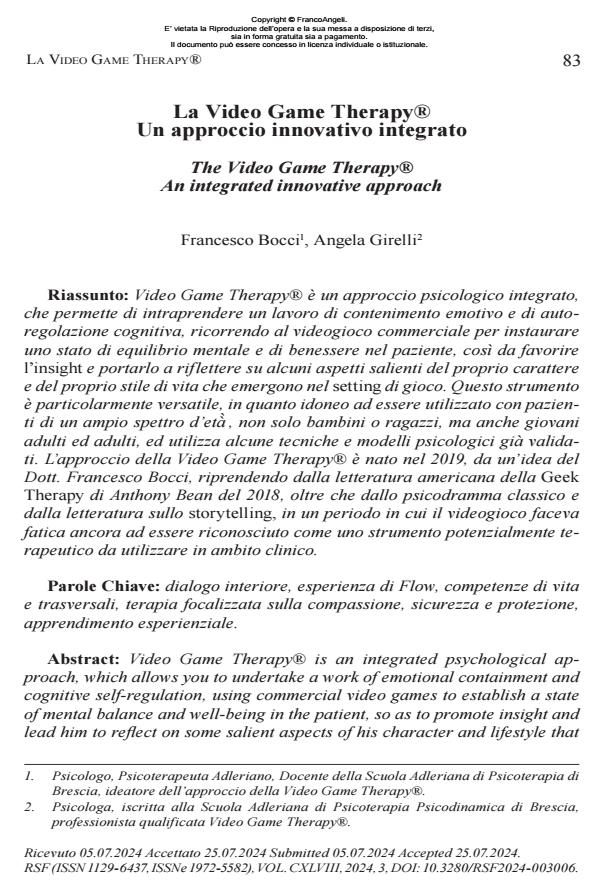La Video Game Therapy® Un approccio innovativo integrato
Titolo Rivista RIVISTA SPERIMENTALE DI FRENIATRIA
Autori/Curatori Francesco Bocci, Angela Girelli
Anno di pubblicazione 2024 Fascicolo 2024/3
Lingua Italiano Numero pagine 31 P. 83-113 Dimensione file 900 KB
DOI 10.3280/RSF2024-003006
Il DOI è il codice a barre della proprietà intellettuale: per saperne di più
clicca qui
Qui sotto puoi vedere in anteprima la prima pagina di questo articolo.
Se questo articolo ti interessa, lo puoi acquistare (e scaricare in formato pdf) seguendo le facili indicazioni per acquistare il download credit. Acquista Download Credits per scaricare questo Articolo in formato PDF

FrancoAngeli è membro della Publishers International Linking Association, Inc (PILA), associazione indipendente e non profit per facilitare (attraverso i servizi tecnologici implementati da CrossRef.org) l’accesso degli studiosi ai contenuti digitali nelle pubblicazioni professionali e scientifiche.
Video Game Therapy® è un approccio psicologico integrato, che permette di intraprendere un lavoro di contenimento emotivo e di auto- regolazione cognitiva, ricorrendo al videogioco commerciale per instaurare uno stato di equilibrio mentale e di benessere nel paziente, così da favorire l’insight e portarlo a riflettere su alcuni aspetti salienti del proprio carattere e del proprio stile di vita che emergono nel setting di gioco. Questo strumento è particolarmente versatile, in quanto idoneo ad essere utilizzato con pazien- ti di un ampio spettro d’età` , non solo bambini o ragazzi, ma anche giovani adulti ed adulti, ed utilizza alcune tecniche e modelli psicologici già valida- ti. L’approccio della Video Game Therapy® è nato nel 2019, da un’idea del Dott. Francesco Bocci, riprendendo dalla letteratura americana della Geek Therapy di Anthony Bean del 2018, oltre che dallo psicodramma classico e dalla letteratura sullo storytelling, in un periodo in cui il videogioco faceva fatica ancora ad essere riconosciuto come uno strumento potenzialmente te- rapeutico da utilizzare in ambito clinico.
Parole chiave:dialogo interiore, esperienza di Flow, competenze di vita e trasversali, terapia focalizzata sulla compassione, sicurezza e protezione, apprendimento esperienziale.
Francesco Bocci, Angela Girelli, La Video Game Therapy® Un approccio innovativo integrato in "RIVISTA SPERIMENTALE DI FRENIATRIA" 3/2024, pp 83-113, DOI: 10.3280/RSF2024-003006